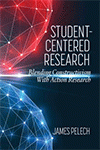
Student-Centered Research
Blending Constructivism With Action Research
By:
James Pelech, Benedictine University
Published 2021
Teachers increasingly are being charged to conduct research on teaching and learning in their classes. Action research is an instrument that teachers can use for their particular classroom to meet this charge. While traditional research provides effective guidelines for teaching and learning, its generalized format does not take into consideration the multitude of variables that affect individual classrooms and students. Action research enables the teacher to improve the learning of the students in their particular context; this, in turn, improves the professional practice of the teacher.
The uniqueness of the model presented in this book is that this model is guided by specific constructivist principles. These principles are then transformed into learning strategies and applied to the action research cycle. Each stage of the action research process also is steered by prompts emanating from the constructivist philosophy. The prompts provide questions that the teacher can use to examine current practices and consider new approaches.
The blending of constructivism and action research enables the teacher to create a new cognitive framework for understanding and enhancing student learning . This book provides a guide for combining two important traditions resulting in a research platform which creates new knowledge about both students and teachers.
CONTENTS
Foreword, William H. Schubert. Acknowledgments. CHAPTER 1: Introduction and Overview. CHAPTER 2: Helping Students Learn. CHAPTER 3: Reflection and Teacher Research. CHAPTER 4: Examining Teacher Research. CHAPTER 5: Cognitive Foundations. CHAPTER 6: Organizing the Constructivist Principles. CHAPTER 7: Important Prerequisites. CHAPTER 8: Planning for the Area of Focus and the Learning Environment. CHAPTER 9: Planning for Data, Data Interpretation, and Communication. CHAPTER 10: Phase 1: Discussing Quiz Preparation. CHAPTER 11: Phase 2: Introducing Active Processing. CHAPTER 12: Phase 3: Affirming Themes and Restructuring. CHAPTER 13: Phase 4: Making Mistakes and Learning. CHAPTER 14: The Final Action Plan. CHAPTER 15: Validity. Index. About the Author.
REVIEWS
"Pelech's book serves as a valuable resource to readers ... who use constructivist theory in our teaching and pre-service methods courses. In addition, the book would be useful to instructors who are curious how education theory and the authentic practices of action research can be blended." James A. Anderson, Jr. Lander University in Education Review (Read full review)
-
Paperback978-1-64802-532-7
Web price: $45.04 (Reg. 52.99)
-
Hardcover978-1-64802-533-4
Web price: $80.74 (Reg. 94.99)
- eBook978-1-64802-534-1

- EDU038000 - EDUCATION: Student Life & Student Affairs
- EDU059000 - EDUCATION: Teacher & Student Mentoring
- EDU029000 - EDUCATION: TEACHING METHODS & MATERIALS: General
-
 Affirming Identity, Advancing Belonging, and Amplifying Voice in Sororities and Fraternities
Affirming Identity, Advancing Belonging, and Amplifying Voice in Sororities and Fraternities
-
 Creating New Possibilities for the Future of HBCUs
From Research to Praxis
Creating New Possibilities for the Future of HBCUs
From Research to Praxis
-
 Cultivating Democratic Literacy Through the Arts
Guiding Preservice Teachers Towards Innovative Learning Spaces in ELA Classrooms
Cultivating Democratic Literacy Through the Arts
Guiding Preservice Teachers Towards Innovative Learning Spaces in ELA Classrooms
-
 Healing While Studying
Reflections and Strategies for Healing, Coping, and Liberation of Graduate Students of Minoritized Identities
Healing While Studying
Reflections and Strategies for Healing, Coping, and Liberation of Graduate Students of Minoritized Identities
-
 Learning to Hide
The English Learning Classroom as Sanctuary and Trap
Learning to Hide
The English Learning Classroom as Sanctuary and Trap
-
 Special Education During the Pandemic
Considerations for Change in Practice
Special Education During the Pandemic
Considerations for Change in Practice
-
 What Comes After Lunch?
Alternative Measures of Economic and Social Disadvantage and Their Implications for Education Research
What Comes After Lunch?
Alternative Measures of Economic and Social Disadvantage and Their Implications for Education Research

